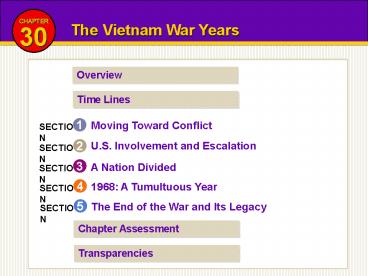The Vietnam War Years - PowerPoint PPT Presentation
1 / 32
Title:
The Vietnam War Years
Description:
Time Line 30 CHAPTER The World HOME 1972 Ferdinand Marcos declares martial law in the Philippines. 1970 Salvador Allende, a Marxist, is elected ... – PowerPoint PPT presentation
Number of Views:26
Avg rating:3.0/5.0
Title: The Vietnam War Years
1
CHAPTER
The Vietnam War Years
30
Overview
Time Lines
1
Moving Toward Conflict
SECTION
2
U.S. Involvement and Escalation
SECTION
3
A Nation Divided
SECTION
4
1968 A Tumultuous Year
SECTION
5
The End of the War and Its Legacy
SECTION
Chapter Assessment
Transparencies
2
CHAPTER
The Vietnam War Years
30
HOME
Vietnam is still with us. . . We paid an
exorbitant price for the decisions that were
made. Henry Kissinger, U.S. national security
advisor under President Nixon
3
CHAPTER
The Vietnam War Years
30
HOME
Vietnam is still with us. . . We paid an
exorbitant price for the decisions that were
made. Henry Kissinger, U.S. national security
advisor under President Nixon
4
CHAPTER
Time Line
30
HOME
The United States
5
CHAPTER
Time Line
30
HOME
The World
6
SECTION
1
Moving Toward Conflict
HOME
7
SECTION
1
Moving Toward Conflict
HOME
Key Idea
America slowly involves itself in the war in
Vietnam as it seeks to halt the spread of
communism.
8
SECTION
1
Moving Toward Conflict
HOME
Section
1
Assessment
SUMMARIZING
What was the Vietnam policy for Presidents
Truman, Eisenhower, Kennedy, and Johnson?
economic aid to France
economic and military aid to South Vietnam
economic and military aid to South Vietnam
stepped-up U.S. military involvement
9
SECTION
1
Moving Toward Conflict
HOME
Section
Assessment
1
10
SECTION
1
Moving Toward Conflict
HOME
Section
Assessment
1
11
SECTION
2
U.S. Involvement and Escalation
HOME
12
SECTION
2
U.S. Involvement and Escalation
HOME
Key Idea
The United States sends troops to fight in
Vietnam, but the war quickly turns into a
stalemate.
13
SECTION
2
U.S. Involvement and Escalation
HOME
Section
2
Assessment
SUMMARIZING
What key military tactics and weapons were used
by the Vietcong and the Americans?
14
SECTION
2
U.S. Involvement and Escalation
HOME
Section
Assessment
2
15
SECTION
2
U.S. Involvement and Escalation
HOME
Section
Assessment
2
16
SECTION
3
A Nation Divided
HOME
17
SECTION
3
A Nation Divided
HOME
Key Idea
An antiwar movement emerges in the United States,
pitting those who oppose the governments war
policy against those who support it.
18
SECTION
3
A Nation Divided
HOME
Section
3
Assessment
SUMMARIZING
What were examples of student organizations,
issues, and demonstrations of the New Left?
- march on Washington (April 1965)
- protest rally in Washington (November 1965)
- civil disobedience at Selective Service centers
- opposition to Vietnam War
- abolition of college deferments
- campus issues
- Students for a Democratic Society
- Free Speech Movement
19
SECTION
3
A Nation Divided
HOME
Section
Assessment
33
20
SECTION
3
A Nation Divided
HOME
Section
Assessment
33
21
SECTION
4
1968 A Tumultuous Year
HOME
22
SECTION
4
1968 A Tumultuous Year
HOME
Key Idea
A shocking enemy attack in Vietnam, two
assassinations, and a chaotic political
convention help make 1968 the most explosive year
of the decade.
23
SECTION
4
1968 A Tumultuous Year
HOME
Section
4
Assessment
SUMMARIZING
What major events occurred in 1968?
24
SECTION
4
1968 A Tumultuous Year
HOME
Section
Assessment
4
25
SECTION
4
1968 A Tumultuous Year
HOME
Section
Assessment
4
26
SECTION
5
The End of the War and Its Legacy
HOME
27
SECTION
5
The End of the War and Its Legacy
HOME
Key Idea
The nations longest war ends after nearly ten
years and leaves a lasting impact on U.S. policy
and American society.
28
SECTION
5
The End of the War and Its Legacy
HOME
Section
5
Assessment
SUMMARIZING
What are some possible newspaper headlines that
summarize the historical significance of each of
the dates listed below?
Massacre at My Lai
Nixon Announces Invasion of Cambodia
Kent State Tragedy
Two Students Killed at Jackson State
Congress Repeals Tonkin Gulf Resolution
U.S. Signs Agreement to End Vietnam War
Last U.S. Combat Troops Leave Vietnam
29
SECTION
5
The End of the War and Its Legacy
HOME
Section
Assessment
5
30
SECTION
5
The End of the War and Its Legacy
HOME
Section
Assessment
5
31
30
Chapter
Assessment
HOME
1. How did the Tonkin Gulf Resolution lead to
greater U.S. involvement in Vietnam?
2. What was President Eisenhowers explanation
of the domino theory?
3. Why did much of the American public and many
in the Johnson administration support U.S.
escalation in Vietnam?
4. Name three factors that contributed to the
sinking morale among U.S. troops fighting in
Vietnam.
5. What race-related problems existed for
African American soldiers who served in the
Vietnam War?
32
30
Chapter
Assessment
HOME
6. What evidence was there that the country was
sharply divided between hawks and doves?
7. What circumstances set the stage for
President Johnsons public announcement that
he would not seek another term as president?
8. What acts of violence occurred in the United
States during 1968 that dramatically altered
the mood of the country?
9. Briefly describe the military conflict in
Vietnam soon after the last U.S. combat
troops departed in 1973.
10. What were the immediate effects and more
lasting legacies of the Vietnam War within
America?































